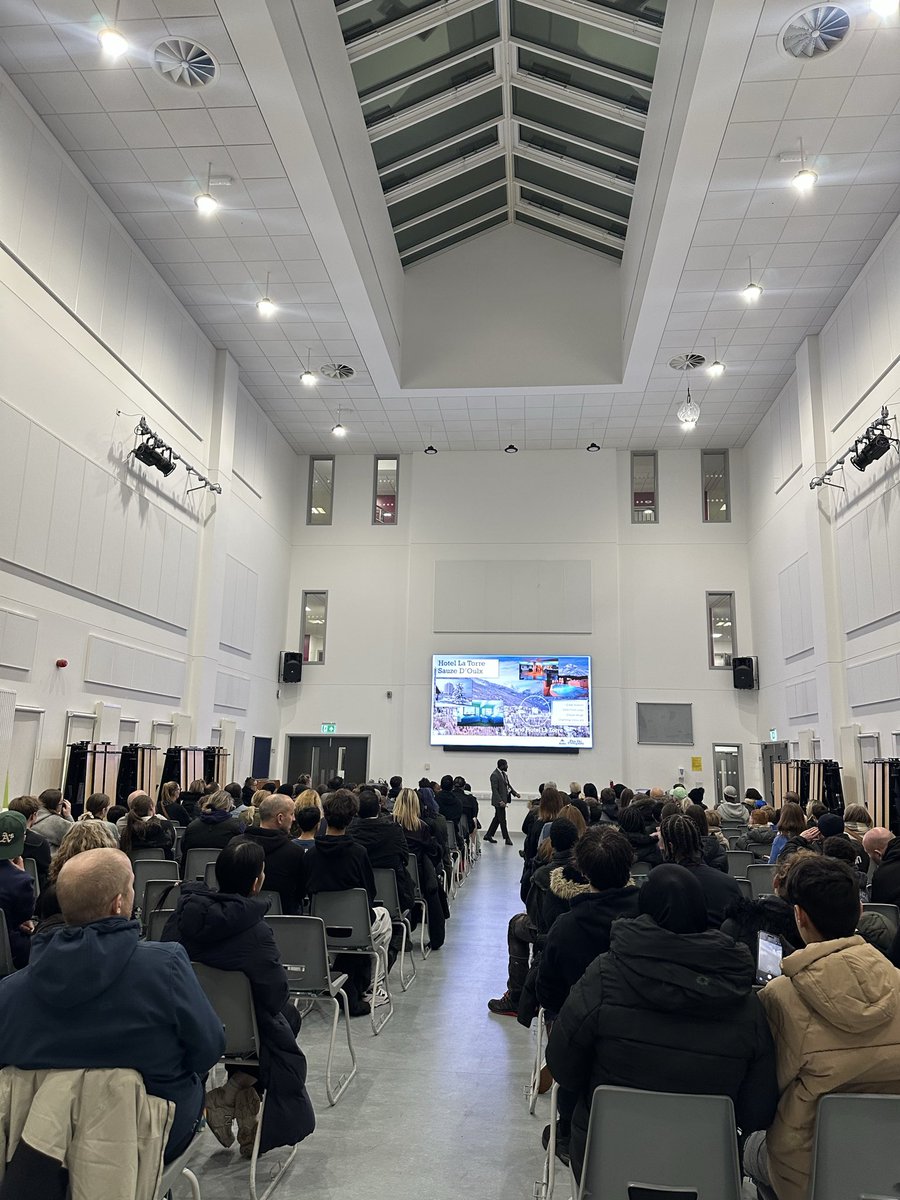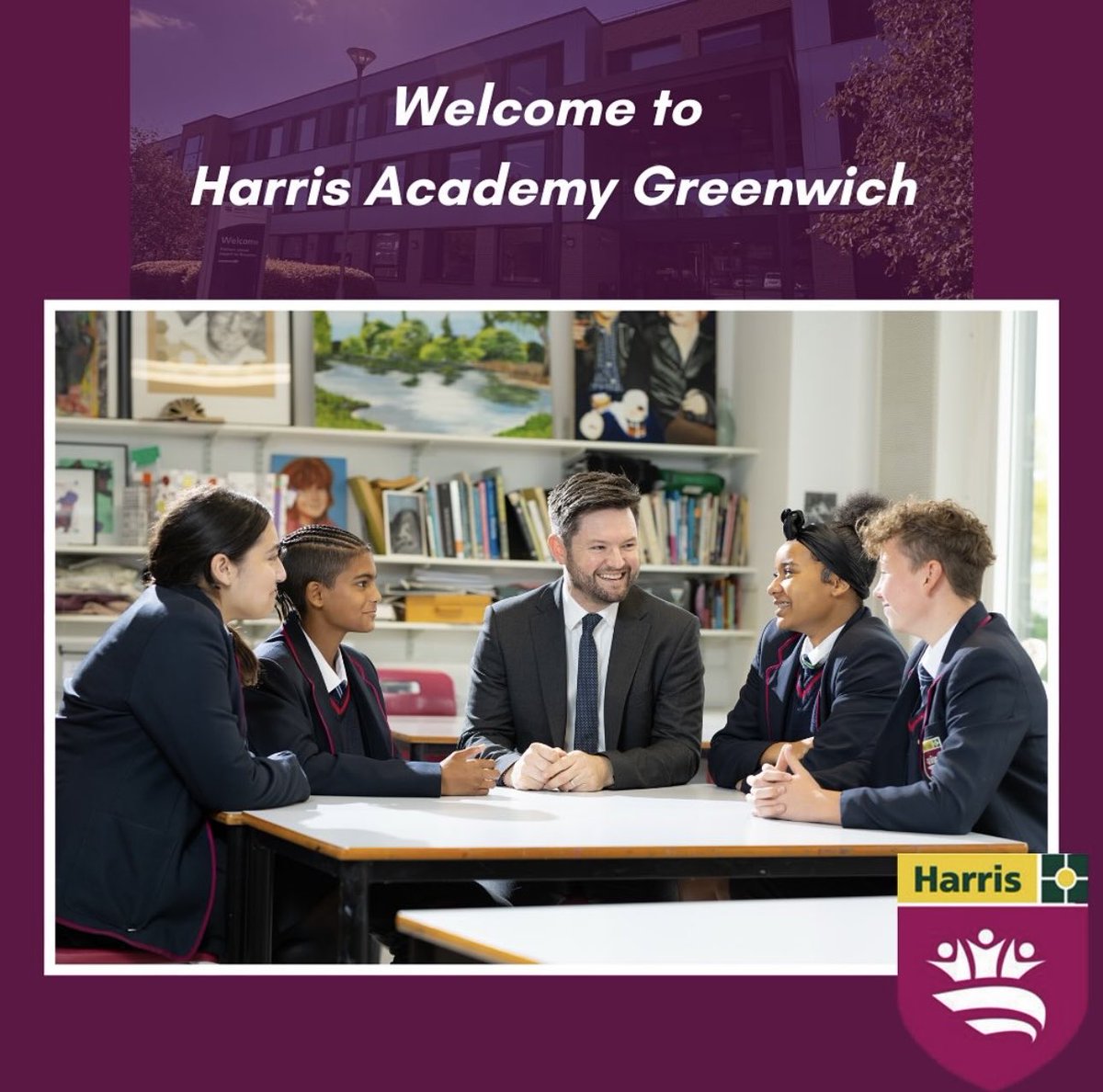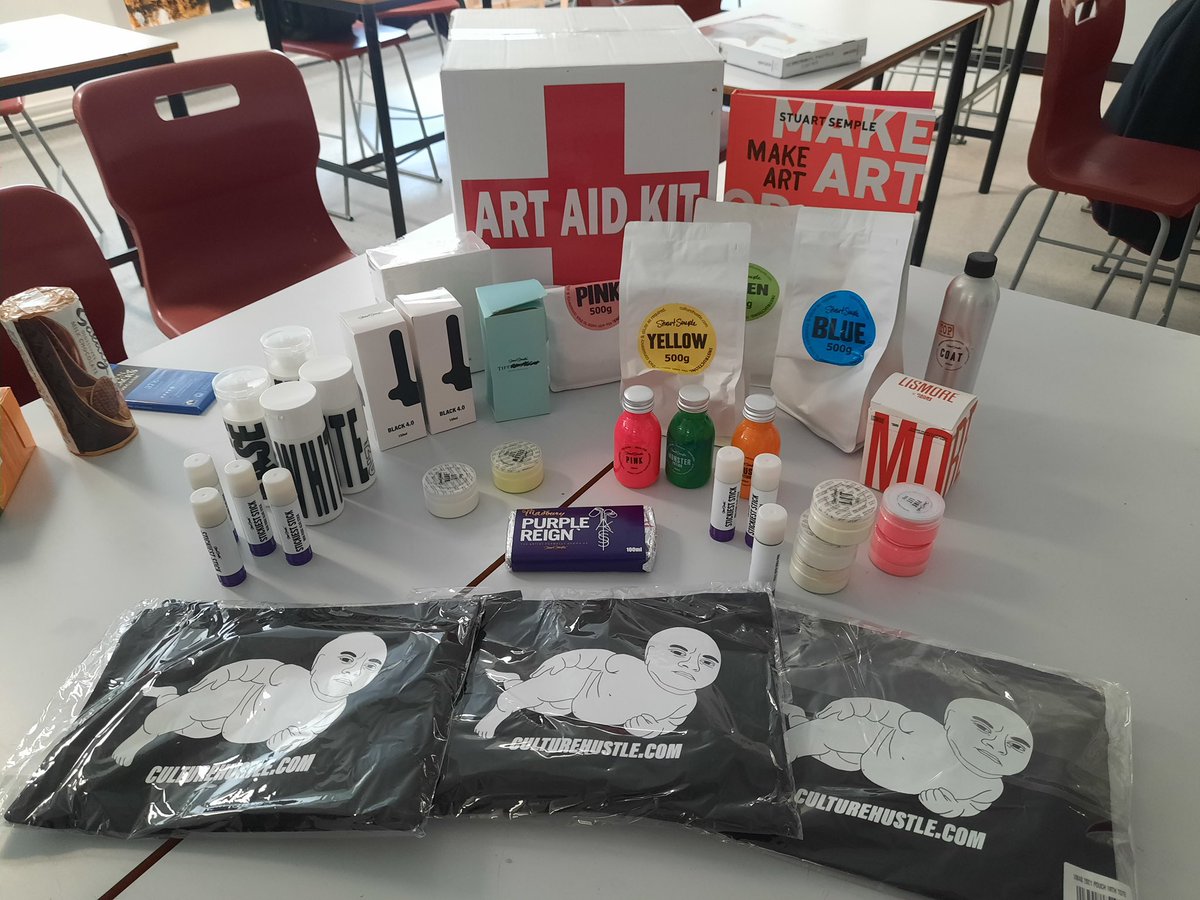The Harris Academy Greenwich Curriculum
Curriculum Overview
The primary aim of Harris Academy Greenwich is to offer every child, regardless of circumstance, the chance to thrive both personally and academically.
This page contains an overview of our curriculum across all Key Stages. Details of the curriculum for each subject (for secondary and sixth form) can be viewed on our Subjects pages. Our curriculum policy can be downloaded from the bottom of this page. For further information about the curriculum please contact Amy Longley-Cook at a.longley-cook@harrisgreenwich.org.uk
Purpose of our Curriculum
We deliver a knowledge-rich curriculum which teaches a depth and breadth of ambitious, broad and diverse knowledge. It is every child’s right, regardless of their academic ability or prior attainment, to access this powerful knowledge: it ensures they are not only able to perform well in public examinations but develop the disciplinary knowledge and social capital necessary to successfully navigate and interrogate the future world they will encounter. For staff at Harris Greenwich, this is a matter of social justice. Every year our results at both GCSE and A level are second to none in the local area but our school is more than just an exam factory. Put simply; Harris Academy Greenwich is a place where all children will Step into their Greatness.
Curriculum leaders constantly review and improve curricular choices by engaging in regular debate on ‘what’ to teach before considering ‘how ‘to teach it. We acknowledge that the curriculum is alive and needs nurturing, it is not a list of content but a canon that must be considered and amended constantly to ensure we teach the best that has been thought, said or written. Leaders set an ambitious intent for curriculum as we know that ‘powerful’ knowledge’, which is specialised and takes its authority from leading academic institutions, gives students power in life.
Examples include:
- In English, we want students to experience the majesty of Shakespeare, and to create deep, cognitive connections in their knowledge by exploring the origins of Greek tragedies and epic poems and its impact on drama across societies, cultures and time periods.
- In Geography, students will develop an appreciation of our dynamic planet, initially identifying how long-standing landscapes like the glaciers of Antarctica have been transformed by modern processes, but also how contemporary lifestyles are transforming landscapes in otherwise barren locations.
- In music, students experiment, rehearse and develop performance skills across a wide range of instruments including piano, keyboard, guitar and vocals, alongside being exposed to and analysing music from all over the world including South American and Eastern Europe. This musical journey allows students to experience, interpret, comment on and perform music of diverse origins and cultural heritage which they otherwise might not have been exposed to

Curriculum choices
The purpose of this academy, and the curriculum it provides, are truly intertwined. We do not believe in pre-determined curriculum pathways that can limit a student’s choice based on their ability, characteristics or background.
We passionately believe in giving students the information and knowledge to make informed decisions about their curriculum entitlement, supported through comprehensive careers guidance at pivotal times in a child’s life.
High quality teaching is the medium by which skills, core knowledge and applied knowledge can be dissipated through a well-sequenced curriculum model. The nature of the Harris Federation makes us collaborative, and this collaboration of subject specialists and researchers means our students benefit from the very highest quality in teaching and the most powerful knowledge. It also enables us to ensure that curriculum knowledge and understanding of our teaching and support staff is central to the personalised and continued professional development that all our staff receive to ensure it has impact in the classroom, for every child, every day.
Our curriculum, then, becomes a deliberate and explicit guarantor of equality as we work to close the limits to opportunity that exist in society. We ensure all our students have access to a broad and balanced body of knowledge regardless of demographics and starting points. We harness the expertise from within our Federation across primary and secondary phases to develop a challenging and rich ‘all-through’ curriculum model, whilst systematically sharing best practice across academies, phases and the wider Federation.
KS3 Offer
Students in years 7 to 9 study the National Curriculum, which has been interpreted, designed and sequenced by subject experts to prepare students for their next steps. Subjects such as Drama, whilst not forming part of the National Curriculum, are core parts of a weekly timetable for our students at key stage three as we understand how it contributes to the personal development of students in areas such as communication, empathy, discipline and emotional intelligence.
Our curriculum is knowledge-rich and delivers broad, diverse and ambitious knowledge, invaluable for ensuring all children are ‘in the know’ and are taken beyond their everyday experience. We believe our curriculum will enable all students to excel, not only in public examinations, but in their interactions with the world, ensuring they are prepared for their next pathway and for them to lead happy, successful lives.
Details of the curriculum for each subject can be viewed on our Subjects page, but a summary of the subjects all students attend includes:
- English (Language and Literature)
- Mathematics
- Combined Science
- Art
- Computer Science
- Drama
- Design Technology and Food Studies
- Languages (French and Spanish)
- Geography
- History
- Music
- Physical Education
- PRG (Politics, Religion and Government)
- Religious Studies
- Careers education
- Personal, Social, Health and Economics education (PSHE)
- Sex and Relationships education (SRE)
KS4 Offer
Students go on to study a rich and varied key stage 4 curriculum which is exemplified by the increasing numbers of students entered for the English Baccalaureate (EBacc), and the large numbers of students accessing more creative subjects at key stage 4 such as art, design technology and music.
The curriculum is filled with ambitious qualifications that match the drive to ensure that all our students achieve outstanding results to enable them to access their chosen pathway at Post 16.
Details of the curriculum for each subject can be viewed on our Subjects page, but a summary of the subjects available to KS4 students is outlined below.
Year 10
- GCSE Fine Art
- GCSE Business Studies
- GCSE Computer Science
- GCSE Citizenship
- GCSE Drama
- GCSE Geography
- GCSE History
- GCSE Health & social care
- GCSE Music
- GCSE P.E.
- GCSE Design & Technology
- GCSE Food Preparation and Nutrition
- GCSE Sociology
GCSE Triple Science - CTEC Sport
Year 11
- GCSE Fine Art
- GCSE Computer Science
- GCSE Drama
- GCSE Geography
- GCSE History
- GCSE Music
- GCSE P.E.
- GCSE Design & Technology
- GCSE Food Preparation and Nutrition
- GCSE Sociology
GCSE Triple Science - CTEC Sport
In addition to their GCSE and vocational qualifications, all students at KS4 also attend lessons and assemblies in the following disciplines to supplement and enrich their education:
- Politics, Religion and Government (PRG)
- Careers education
- Personal, Social, Health and Economics education (PSHE)
- Sex and Relationships education (SRE)
- Physical Education (Core PE)
- Socially and culturally significant events (Black History Months, LGBTQ History Month, International Women’s Day)
EBacc - an academic curriculum
As adults, we know that life can be demanding as we work our way through the ups and downs that it brings. Responsibility, character and resilience are so important as we face these varied challenges head on, whilst trying to remain positive, determined and aspirational.
A key element of this aspiration is ensuring that students have the opportunity to develop these core skills through a highly academic and challenging core curriculum which is blended with additional curriculum options that allow all students to access a range of qualifications. These qualifications will serve them well in life, whichever pathway they choose to take or door they decide to open.
Qualifications give students choices in life. They open doors and provide new opportunities and fulfilment. To achieve this vision we ensure that our curriculum is not shortened at Key Stage 3 and not narrowed at Key Stage 4.
The EBacc qualification involves students studying English, Maths, Science, History or Geography and a language. This is a very demanding set of curriculum subjects and has high level of expected knowledge development, retention and application. This curriculum intent will robustly challenge all students academically. For those students who do not study the full compilation of the EBacc subjects, they will all still study a very demanding compilation of core curriculum subjects which includes English, Maths, Science and either History or Geography. This again, will require a high level of knowledge development, retention and application when covering the curriculum intent.
The aims and principles of our curriculum
To provide all students with opportunities to access and engage with the best that has been thought and said, but also to help students comprehend that while knowledge is powerful it is also insecure, contested and evolving. We encourage our students to see themselves as contributing to scholarship.
An enriched vocabulary enables a better understanding of concepts and ideas, and we facilitate access to knowledge beyond our students’ ordinary daily experiences. We do this by expanding their cultural capital and the breadth of their vocabulary. Children are exposed to a variety of texts both fiction and non-fiction, a wide range of creative arts and thoughtfully-planned learning outside the classroom.
We recognise that “the curriculum” is not just a timetable and that engagement in extra-curricular opportunities is encouraged at every stage through everything from the co-curricular after school programme, The Saatchi IGNITE programme, The Duke of Edinburgh Awards, Personal Development Programme, the Harris Experience, the Federation Sports Day and the events that give platforms for all the talents.
Design Principles of Harris Academy Principles of curriculum design and sequencing at HAGR
To ensure that our curriculum empowers our pupils to step into their greatness, our curriculum has been carefully thought through and designed.
Our subject team leaders have designed and planned their curriculum according to the following 6 principles:
- Our curriculum is ambitious, offering an immersion in the most powerful knowledge of each subject.
- Our curriculum is sequenced so that new knowledge builds upon old, and students become increasingly fluent over time.
- Our curriculum is specified in detail so that teachers and students are clear what needs to be learned.
- Our curriculum is taught to be remembered not merely encountered
- Our curriculum is supported with a literacy strategy that supports increased vocabulary acquisition and reading fluency.
- Senior and Middle Leaders have the skills and knowledge to design, implement and review the live the 7-year curriculum
The research and beliefs driving these six principles are as follows:
- Powerful Knowledge – Michael Young (2007) advocates that one of the primary purposes of schooling is to teach rich knowledge that enables pupils to understand and think about content beyond their own experience, and to engage with the ongoing, intellectual conversations and discourse across a range of subject disciplines. By teaching pupils powerful knowledge at Harris Academy Greenwich, we will seek to empower our pupils to realise their potential by widening their horizons and opportunities, equipping them to engage with that intellectual conversation and contribute meaningfully to society.
- Procedural knowledge and Automaticity – Pupils will be explicitly taught the skills to apply powerful knowledge in subject disciplines, so that they are able to engage with the procedures, processes and methods fundamental to success with increasing automaticity and expertise.
- Learning for Mastery – Pupils will get better in their subject disciplines, each and every lesson, irrespective of their starting point. Pupils will learn the value of practice, hard work, and resilience in achieving success, so that they can apply this approach to anything in life.
- Disciplinary Literacy – The ability to read, write, listen and speak with precision and confidence is crucial for deepening mastery of content. Disciplinary literacy sits at the heart of our curriculum, encouraging our pupils to increasingly communicate with excellence.
- Sequential & Coherent Planning – In order to prepare our pupils for later life, our subject curriculars are planned from university study and expertise, so that learning is incremental, orderly, and progressive for pupils to build knowledge and skills in a manner encouraged by cognitive science and educational research.
- Depth and Breadth – Amassing expertise and proficiency in the identified core knowledge, skills and concepts in all subjects, will support pupils in thriving in all topics within those disciplines. Knowledge and skills are incrementally built up by encouraging pupil mastery over content, enabling pupils to access the full curriculum entitlement.
- Ambition – To ensure our pupils seize their inherent greatness, our curriculum is ambitious, challenging, and designed to push pupils to their capacity.
- Assessment – We will engage with both formative and summative assessments to check the progress of our pupils, so that we can respond to their needs and offer an education that is flexible and responsive. By regularly assessing pupils, teachers’ scaffolding, support and stretching can be differentiated accordingly.
Ongoing Curriculum Review Cycle
In service of ensuring our ambitious curriculum is enacted as intended, the senior leadership team work throughout the year with subject team leaders to review and evaluate the design, sequencing and common approaches to implementation. We believe in ‘curricular thinking’ and know that this work of reviewing happens constantly. We review curriculum in numerous ways:
- Through regular debate and discussion in Tuesday CIGs (Curriculum Implementation Groups). This is where subject content is discussed, and instruction rehearsed.
- Curriculum Snapshots: In regular line management meetings, leaders get curious about the intent of curriculum and go and see how the curriculum is enacted
Curriculum Reviews:
- Throughout the year senior leaders will review how curriculum is enacted and use this information to inform curricular thinking and changes.




















